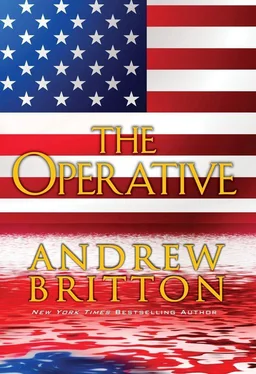Andrew Britton - The Operative
Здесь есть возможность читать онлайн «Andrew Britton - The Operative» весь текст электронной книги совершенно бесплатно (целиком полную версию без сокращений). В некоторых случаях можно слушать аудио, скачать через торрент в формате fb2 и присутствует краткое содержание. Жанр: Триллер, на английском языке. Описание произведения, (предисловие) а так же отзывы посетителей доступны на портале библиотеки ЛибКат.
- Название:The Operative
- Автор:
- Жанр:
- Год:неизвестен
- ISBN:нет данных
- Рейтинг книги:5 / 5. Голосов: 1
-
Избранное:Добавить в избранное
- Отзывы:
-
Ваша оценка:
- 100
- 1
- 2
- 3
- 4
- 5
The Operative: краткое содержание, описание и аннотация
Предлагаем к чтению аннотацию, описание, краткое содержание или предисловие (зависит от того, что написал сам автор книги «The Operative»). Если вы не нашли необходимую информацию о книге — напишите в комментариях, мы постараемся отыскать её.
The Operative — читать онлайн бесплатно полную книгу (весь текст) целиком
Ниже представлен текст книги, разбитый по страницам. Система сохранения места последней прочитанной страницы, позволяет с удобством читать онлайн бесплатно книгу «The Operative», без необходимости каждый раз заново искать на чём Вы остановились. Поставьте закладку, и сможете в любой момент перейти на страницу, на которой закончили чтение.
Интервал:
Закладка:
“Hold on, Ryan,” the president said. He looked at Cluzot. “Charles?”
The FBI director shook his head. “Not standard issue.”
“Is there any chance Hunt was right about her?”
“It’s possible,” Cluzot said. “Veil disappeared on her watch.”
“Mr. Cluzot,” Kealey said, “Mr. Bishop impressed on me that Agent Muloni seemed genuinely convinced that he was responsible for the assassin’s escape. She pointed out something else, something I’d noticed, too. The shooting at Penn Station started virtually the minute we walked onto the street. The gunfire took down people all around us, and I mean every side. We were left alone.”
“She was watching you?” Andrews asked.
“Apparently,” Kealey said.
“Then, and I’m sorry to say this,” the president said, “how do we know that Bishop isn’t a part of this? Maybe his daughter was an unintended casualty.”
“I don’t think so, Mr. President,” Kealey said. “He’s been on board with me from the start, letting me run the show. He comes alive when we’re on the trail of these killers.”
Brenneman looked at the others, his expression asking them if they were okay with Kealey’s explanation. All of them nodded.
“What are you doing now?” Brenneman asked.
“I’m leaving the bridge and heading uptown-on foot until I clear the traffic. I have a feeling we may take one more hit here. People are being fed through bottlenecks out of the city. That’s too tempting a target to ignore. It’ll either be the Port Authority Bus Terminal or Grand Central Station. I’m betting on the latter.”
“Why?” Andrews asked.
“High perches and easy getaway to the side streets,” he said.
“All right,” the president said. “Do you want support there?”
“The NYPD is pretty high alert right now,” he said. “I’m sure the National Guard at both locations is the same. Not much more we can do on that front. And there’s no point clustering even more high-value security targets in one place.”
“True,” Brenneman agreed.
“I’m going to see this through, then get downtown for a belated look at Hunt’s project,” Kealey said.
“How is Bishop?” Carlson asked.
“All right. Focused. I have him checking on something. Is anything new there?”
“Nothing that would help you,” Andrews said.
Kealey would understand that to be code for “There’s no significant data, so don’t bother going out of the way to find a secure location.” And they would understand that he was not in a position to tell them where Bishop had gone. Not on an open line. The president presumed it was to the FBI lab at One West Street.
Andrews hung up and went back to placing the call to Brigadier General Gilbert.
“THP reports that the van stopped west of Interstate Thirty, on Pine Street,” Perry reported. “Showing an Arklight Dome Lodge there.”
“Bob, hold on,” the president said.
Andrews and the others all looked at him.
“White Sands is not the issue,” Brenneman said. “You had cargo off-loaded in New York, and possibly in Arkadelphia.”
“Hell, they could have stopped anywhere,” Carlson said.
“That’s true,” the president agreed, “but we need to at least alert the police in Little Rock and Dallas. Bruce?”
“On it, sir.”
Cluzot seemed surprised. “Only the police?”
“Unless we freeze out your AD Hunt, I don’t think we can risk notifying any field offices, Chuck.”
“Sir, we’ll need all eyes on this that we can get-”
“Those cities have terrorist units, good ones,” Brenneman said. “I know. I signed the funding bill.”
“Mr. President, why don’t we want to talk to General Gilbert?” Andrews asked.
“Let’s see if he files an action memo,” Brenneman said. “He apprehended civilians. That should be coming in soon. If he doesn’t, we’ll know he’s running black ops and we’ll need to find out why.”
“I’ll tell the chairman of the JCS to let us know the instant that comes in,” NSA chief Perry said.
The thought was chilling. That this was a domestic-based action was frightening enough; even the hint that the military could be involved made it that much worse. One could be aggressively fought; the other could, at best, be aggressively defended against. There was a potentially devastating difference between the two.
As the president finished his coffee, he turned to the computer monitor to have a look at the online edition of the Washington Post. What he saw caused him to forget the cup, the room, the passage of time. He said nothing until he heard Perry’s voice.
“Mr. President… another situation.”
CHAPTER 27
NEW YORK, NEW YORK
The Port Authority Bus Terminal was a grim, inelegant structure that blotted Eighth Avenue between Fortieth and Forty-Second Streets. Shadowed by its own latticed box of elevated bus lanes and mostly surrounded by old New York buildings that offered relatively little gaiety, it was primarily a way station between Manhattan and New Jersey, or a point of departure for people who couldn’t afford the more expensive trains that departed a few blocks south from Penn Station or who lived in the smaller towns serviced by the eighteen different carriers.
The large, impersonal interior space was like a crab carapace with spindly legs extending outward. Commuters patronized the food and beverage stands, magazine and book stalls, trinket shops, and other impersonal stores. The lower level was primarily a waiting area, cramped and claustrophobic.
Shameen Al Dhahrani passed the statue of Ralph Kramden as he headed for the terminal entrance. A freshman student at NYU, the Saudi had never heard of The Honeymooners, but he would not have been surprised to learn that Americans had erected a statue to a fictional bus driver from a television show. Americans lionized false gods. These hollow deities took the place of true faith and morality, which was one of the reasons he was racing to catch a bus. There was to be a rally outside a shopping mall in Wayne, New Jersey. It seemed a suitable venue to demand the payment of reparations to detainees at Guantanamo Bay. He carried a leather case thick with flyers he would hand out to shoppers or place on car windshields. A psychology major, he would remind himself with each rejection that these people had been conditioned by their news media, by their televisions, to believe that wrong was right. They had been brainwashed to insensitivity, to self-absorption.
The doors slid open to admit him. He looked at his watch to see how much time he had. He had purchased his ticket online, so all he needed to do was grab a cup of tea if there was time and make his way to the departure gate.
He saw the nickel-plated brass wristband where his watch should have been. Set in the band was a blue and white marble. He slowed, but he did not stop. He looked into the cavernous lobby-ahead, to the sides. He blinked. It was as if a creamy film had gummed his eyesight. He blinked harder.
The haze cleared, and he saw an arena. There were people in the stands. A sandy surface lay ahead of him. He approached a large circle of guards, dressed in military uniforms, standing watch-around what? They were standing far enough apart so that if Shameen moved his head slightly to the right, he could see between them. There was a man standing beyond them. He was dressed in a loose-fitting white thobe, a full-length skirted garment, with a red and white checkered k f ya around his head. The ends of the cloth were pulled across the lower half of his face, forming a mask.
The man held a saber.
Someone was kneeling before him, facing away. A woman. She wore a white burka, which had been pulled around her shoulders. On her head she wore a black hijab, which was raised from her neck by pins.
Читать дальшеИнтервал:
Закладка:
Похожие книги на «The Operative»
Представляем Вашему вниманию похожие книги на «The Operative» списком для выбора. Мы отобрали схожую по названию и смыслу литературу в надежде предоставить читателям больше вариантов отыскать новые, интересные, ещё непрочитанные произведения.
Обсуждение, отзывы о книге «The Operative» и просто собственные мнения читателей. Оставьте ваши комментарии, напишите, что Вы думаете о произведении, его смысле или главных героях. Укажите что конкретно понравилось, а что нет, и почему Вы так считаете.












